By Mark Ellis —

In 2013 Caleb Byerly woke up with a start and began to furiously write in his journal everything he saw in a rather unusual dream. For the previous five years, the small-town North Carolina resident had been engaged in mission outreach to indigenous people and tribal areas in Southeast Asia and the Pacific Islands.
“In the dream, I was standing on top of this mountain. I was looking out across the mountain, and I saw a tribe of people,” he told The Unseen Story. Caleb and his wife, Gladys, live in Moravian Falls, a town of 1400 in the foothills of the Brushy Mountains.
He had never seen the tribe before, so he asked, “What tribe are you? What people are you?”
“We’re the Tinananon tribe,” they replied. Caleb had never heard of this people group and he began to carefully observe their actions in his dream.
A tribal chief walked forward carrying a musical instrument. Caleb happens to be an instrument maker by profession, so his eyes “zoomed in” to study the distinctive design of an instrument unlike anything he had ever seen before.
It had 30 strings going all the way around the top of a golden bowl, from the outside, crisscrossing in the middle of the instrument. “I suddenly got a full download of everything about this instrument, what dimensions the instrument was, what material it was made out of, even like how it was tuned and how it was played. After that, I kind of zoomed back out.
“This tribal chief, he took the instrument and he put it on the table. He took two small sticks, and he began to play this instrument. As he played the whole tribe started to dance and they started to worship. This kind of sound of worship just filled the place. It was as if heaven and earth just collided. After that I woke up from the dream.”
God has spoken to Caleb through dreams previously, so he meticulously recorded in his journal the name of the Tinananon tribe. He made detailed drawings of the bowl, its dimensions and materials, a wooden ring that goes around the bowl, the strings connected by wooden pegs, and the two sticks used to play the instrument.
“I feel like when God speaks to you, it’s an invitation to partner and walk with God. It’s not just God commanding you to do things or God just saying do this, do that. But it’s the Holy Spirit inviting you into some new journey that he’s calling you into, and it’s connected to you, it’s connected to your DNA and your calling. I really value that a lot. I really thought that this would be a really exciting thing to follow with the Lord.”
Caleb began to search online for any reference to a Tinananon people group but came up short. “I contacted different organizations like Wycliffe Bible Translators, and Summer Institute of Linguistics to see if they knew anything about this tribe. But everywhere I searched, I could not find that word. I tried the different spellings, but just couldn’t find anything there. So I kind of gave up on that.”
But as a professional instrument maker, he was intrigued by the idea of recreating the instrument he saw in the dream. “I’m gonna make this thing!” he decided. Even though he had not put metal and wood together in that way, he was up for the challenge.
“I got into my shop, and I just kept breaking this thing. I kept breaking things and snapping things. I could not figure out this one process. I got really frustrated. I was like, I’m just gonna put this thing to the side. I just couldn’t figure it out.
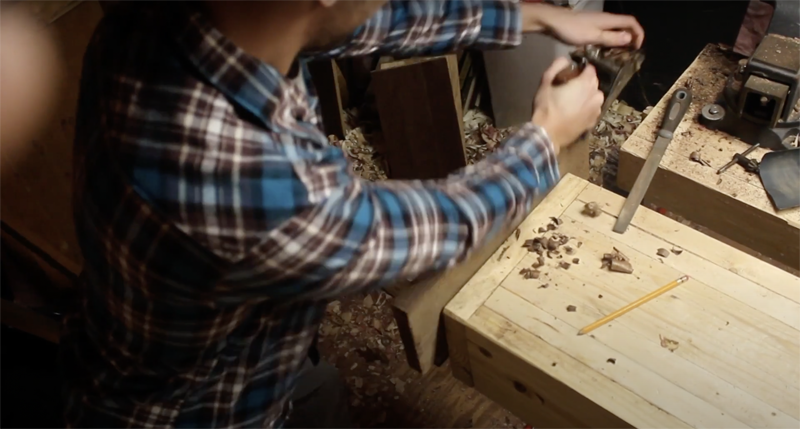
“So, I kind of gave up on the whole dream. I felt like I had done my part. I wasn’t getting anywhere. So I just kind of gave it up.”
Trip to the Philippines
About six months later, he took a mission trip to the island of Mindanao in the southern Philippines, an area where he had previously been involved in ministry.
“I was on a Jeepney, which is like a public transportation. There was this man that was sitting on the other side of me. I could tell this guy was staring at me. I was like, what’s this guy doing? Every time that I would look at him, he would like look away.”
Caleb knows the national language of the Philippines, Tagalog, so he spoke to the man. “As I was talking to him, it turns out that he’s a believer! So we’re chatting and then right in the middle of our conversation, I heard the Lord speak to me. It wasn’t an audible voice or anything. It was just felt.”
The Lord spoke to Caleb’s heart and said, I want you to ask that man about the Tinananon.
Inside, Caleb resisted. No, I’m not going to ask this man about the Tinananon, he thought. I’ve already tried to do all my research.
A second time the Lord nudged his heart, Ask this man about the Tinananon.
Caleb built up his courage and said meekly, “Sir, do you happen to know Tinananon?
As soon as he said he word Tinananon, the man’s eyes got really big.
He leaned in and said, “Hey, that’s my people — that’s my tribe! How do you know my people?”
Caleb was rendered speechless for a moment. “Tell me everything you know about your tribe.”
Manigos began to explain that his tribe lives in a deep mountainous region of Mindanao. “This area is a really dangerous place,” he said. “No one from outside goes to this place.” Manigos estimated his people group numbers between 70,000 and 100,000 people, scattered throughout the mountainous region in pockets.
Caleb invited Manigos to follow him to the place he was staying and showed him his journal entry with the word Tinananon.
Manigos began shaking his head, and tears streamed down his face.
He said, “Remember earlier on the bus, I kept looking at you.”
“Yes, what was that all about?”
“I kept looking at you, and the reason why is because I’ve seen you before…I just realized where I saw you, I also saw you in a dream.”
Manigos explained that was born in the Tinananon tribe. He left as a young man and went to Davao City, the largest city on the island of Mindanao, with 1.8 million people. He came to know Jesus while he lived in the city, then God called him back to his tribe through a dream.
In the dream, Manigos had gone back to evangelize his people – with Caleb! “He saw me in his dream,” Caleb said, “and I came and joined him. He and I began to minister and bring the good news of Jesus to his people.”
They were filled with wonder and awe at the way God brought them together. The two men stayed together for several days. “We all worshipped together and prayed together for a few days. Manigos invited Caleb to visit his tribe.
“Yeah, I would love to go to your tribe,” Caleb replied, “but I need to ask my wife first.” His wife, Gladys, was eight months pregnant at the time. Going on a potentially dangerous journey, immediately before the birth of their first child was a big decision they had to make.
After Caleb flew home to North Carolina, he and Gladys sought the Lord’s direction. “We felt like the Lord’s hand was on it,” he said. “And if the Lord showed this, up to this point, then He would continue to be with us. So I decided I was going to go, but I wanted to get back in the shop and try to make this instrument again.”
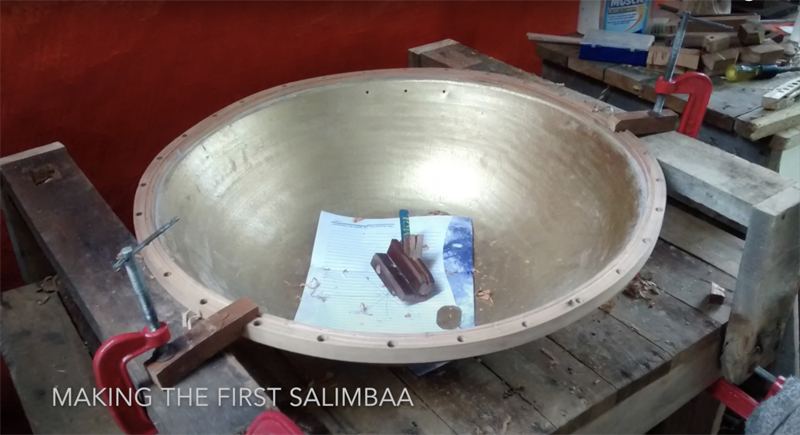
Caleb got very focused and asked the Holy Spirit to help him. “The Lord gave me wisdom, gave me insight on the process of what to do…with the help of the Holy Spirit and my wife, we were able to get it. I finally made this instrument!
He put the strings on it for the first time. “I tuned it up the way I heard it in the dream. I got the two little sticks. And I started to play it. It was that same sound, the same sound that I heard in the dream. And I was like, this is it. I was just really excited about it.”
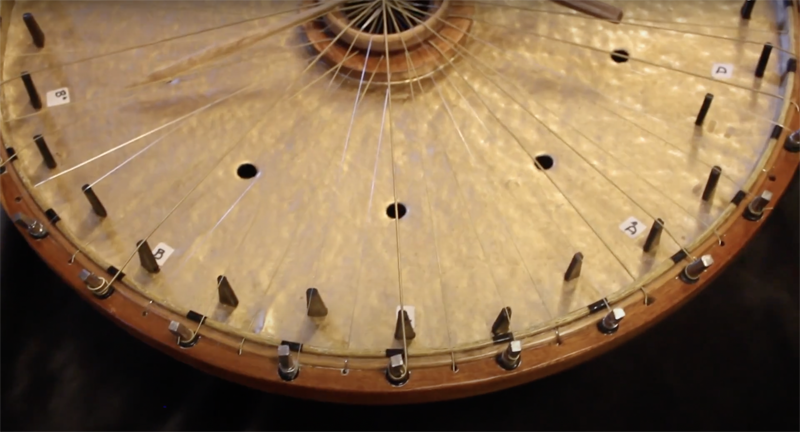
Caleb bought a plane ticket and left the next day for the Philippines, taking the instrument with him.
He met a tribal friend named Ansulao and his new friend, Manigos, at the border of the mountain range closest to the tribe. “All three of us, we got on this one little motorbike. It was like 120 cc, a little motorbike.”

A large storm had passed through the steep, undeveloped mountainous area the day before. “It was really muddy, very hard to get through there. And then while we were on this motorbike, another storm came. I was trying to hold this instrument, and I couldn’t hold it to my left or my right, so I had to put it above my head.
“Imagine three people on a little motorcycle. I was holding this musical instrument above my head trying to balance.”
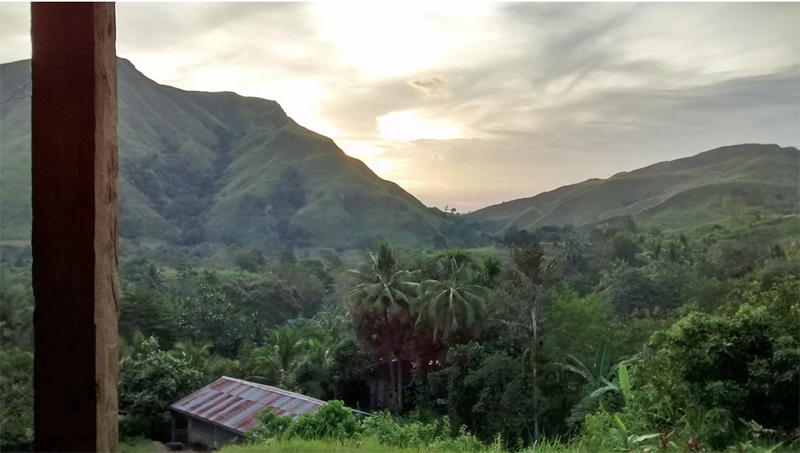
They came to a hanging bridge, which consisted of two ropes and primitive wood planks. They managed to get across the bridge and were going up a steep hill, when the motorbike popped its gear and went into neutral.
Suddenly they were flying backward, toward the cliff. The motorbike wheel hit a rock and all three men went flying. “Thank the Lord, we landed in this smooth, green patch of grass, just feet away from the cliff, the drop-off cliff!”
As they entered the area of the Tinananon tribal group, Caleb heard the still small voice of the Lord once more: Caleb, I want you to take the instrument to the chief.
They started asking about how to find the chief’s house, which they learned was another three and a half hours away, on the other side of the mountain.
By the time they reached the chief’s house it was almost evening. Mud covered their clothing as they approached a small wooden house and knocked on the door.
When the chief opened the door he had a shocked expression on his face – especially to see an American in this remote area.
“We are, I am coming to your tribe for the first time,” Caleb said. “I just wanted to give this as a gift to you,” he said, holding the instrument in his outstretched arms, covered by a blanket.
The chief placed the instrument on a table and took the blanket off of it. “He saw this instrument and he started staring at it. He kept looking at this instrument over and over again. He kept asking me, ‘Where did you get this instrument from?”
“Well, I just kind of made it,” Caleb replied.
“No, no, I’m serious. Where did you get this instrument from?”
“Well, if you really want to know. Last year, I had this dream. In the dream I heard the name of your tribe, the Tinananon, for the first time. I’d never heard that word before. I also saw this musical instrument in the dream. I felt like my God has given this dream to me.
“After that I met this man, Manigos, who is from your tribe, and he helped me lead me to your house today. I was able to make this instrument. I just felt like I wanted to give this instrument to you today.”
The chief continued shaking his head in disbelief, examining the instrument carefully, asking questions about it. He summoned other leaders from the Tinananon tribe and they walked around it incredulously, pointing at it, saying “Salimbaa.”
“They have their own native tongue,” Caleb notes. “And I don’t totally understand their language. So I was pretty lost about what they were talking about.”
Finally, the chief motioned to them and said, “I need to show you something.” They left his house and went down a small pathway over to another structure.
“They call the house Paluvaran, which means House of Prayer in their language. This is the place where they worship. But it’s also sort of a storehouse of all their kind of ancient articles of their tribes. They have pottery work, metalwork, weaving, all these different things that are tangible evidence that their tribe has been living and existing for hundreds of years.
“I was amazed by this place. They had all these musical instruments on the side of the wall.” As a professional instrument maker, Caleb found it fascinating, incredible.
The chief informed him there were different musical instruments for each of their gods. “They have the god of the tree, the god of the stone, god of the river. And they’re not necessarily gods, but they believe that the one true God or the Creator has sent down angels to guard these different things like the angel of the river, the angel of the stone.
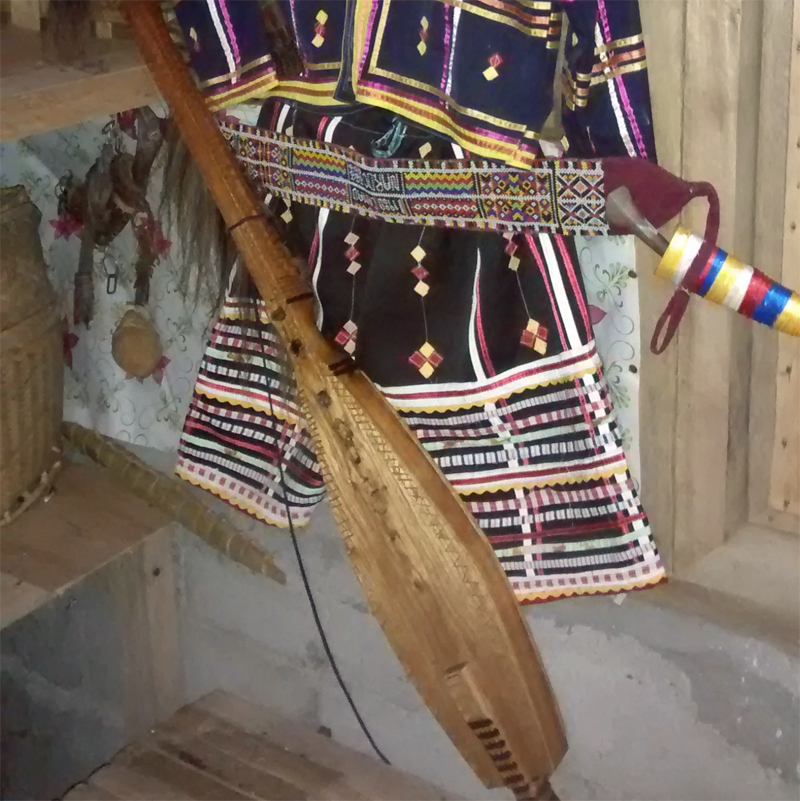
“Instead of praying and worshiping directly to God, they pray and worship to these different angels; the angels would be the ones to connect them to God. And so it’s a little bit different, but it’s not completely like they believe in many different gods, they believe in the one true God.”
Caleb noticed there was one spot that was empty on the wall between the other instruments. “They said that somewhere between 100 and 150 years ago, there was a tribal war. During this war, their most valuable musical instrument that worshiped the God of all gods was taken away from them.”
In response, they lamented for a time and created a song that goes something like this:
The Salimbaa was taken away from us,
God is going to redeem it back to us one day.
“It was a prophecy. This instrument is the instrument that worships the God of all gods. They said, ‘Today, you brought the Salimbaa to us!’”
Caleb was blown away. “Oh my goodness!” he exclaimed.
After that there was a small gathering of tribal leaders. “This is it! This is the Salimbaa!” they cried. Everyone knew what it was when they saw it and heard it played.
Caleb learned the Salimbaa’s golden bowl, with strings stretching from side to side around the bowl, that the convergence in the middle is the place where the Tinananon believe the Salimbaa connects heaven and earth.
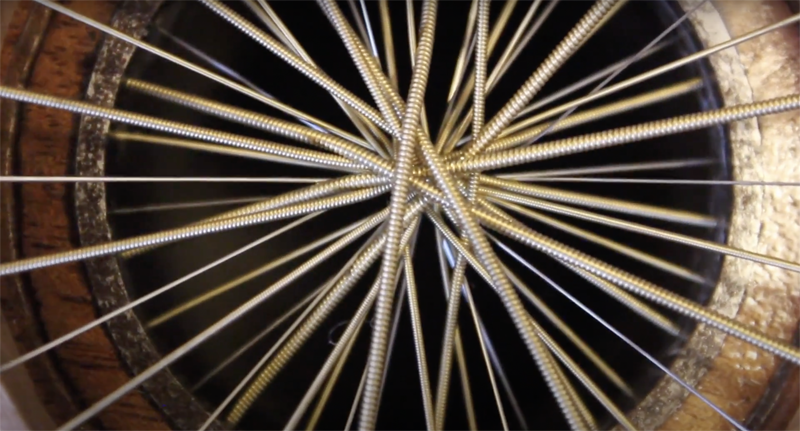
“They said that, in the last time, in the last days, God is going to be coming down from heaven, and he’s going to call all the righteous people to him. When God comes down from heaven, God is going to be riding on the inside of the Salimbaa, as if the Salimbaa was an aircraft that connects heaven and earth.”
Their name for the God above all gods is Manama. “They started praying to Manama…and they dedicated this instrument back to God.”
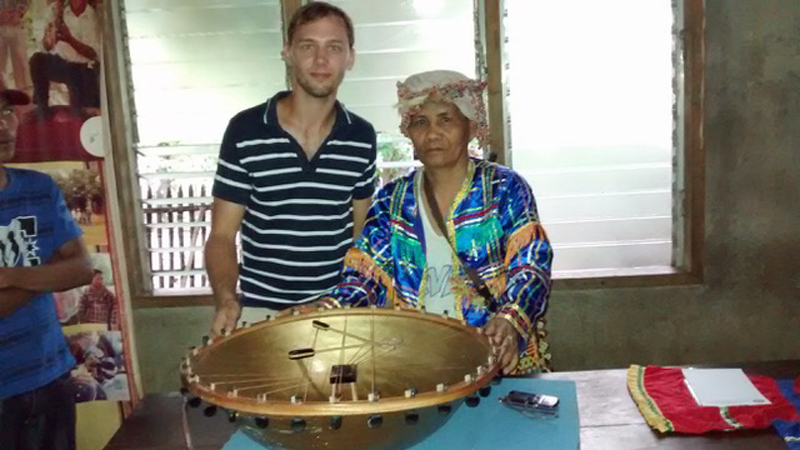
As a sign of special honor, the chief placed a tribal leader’s headpiece on Caleb’s shoulder. “We now consider you a chief of the Tinananon tribe,” he said. “Whatever you believe God is calling us or leading us into, we’re going to follow you.”
Reeling from the whole experience, Caleb was humbled by the gesture. They stayed with the chief, Datu Lipatuan Suhat, for three days.
“There wasn’t a lot that manifested with him giving his life to Jesus,” Caleb told God Reports. “I did pray with him a lot and prophesied over him. But after we left, we didn’t return for a few months, but during that time, within a month or two, the chief had an encounter with Jesus, and the Lord spoke to him and he wrote everything out. That is when he gave his heart to Jesus.”
On the second visit, Caleb asked Chief Suhat how he could help the tribe.
“Well, if you can help us with one thing, I want you to help us translate the Bible into our language.”
In January 2015, Caleb arranged for Translators Association of the Philippines to meet with all 50 chiefs of the Tinananon tribe.
“Some of the chiefs didn’t want the Bible to be translated and others did,” Caleb told God Reports. “There was tension in the room. None of us as foreigners felt led to speak up. The chief came up to the front and opened up the Cebuano Bible, from Genesis.”
Caleb learned the Tinananon believe that God came down and took the soil of Mindanao and put it in his hands and blew on it and that is when the first man came alive.
“We believe God made man from his breath,” Chief Suhat said, “by taking the dust of the earth and breathing on it.”
Chief Suhat proceeded to read the biblical account of the creation of man:
And the LORD God formed man of the dust of the ground, and breathed into his nostrils the breath of life; and man became a living soul. (Genesis 2:7)
Then the chief paused, set the Bible down, and said: “It’s only the first few pages, imagine what it would be to have the whole Bible translated.”
The other chiefs nodded their heads in agreement. “That’s true,” they said, and all 50 agreed to let the translators begin their project.
Chief Suhat passed away in 2015, shortly after the translation process began.
Since then, there have been four churches planted among the Tinananon. “It’s just amazing, the open doors that the chiefs have given us for this tribe,” Caleb says.
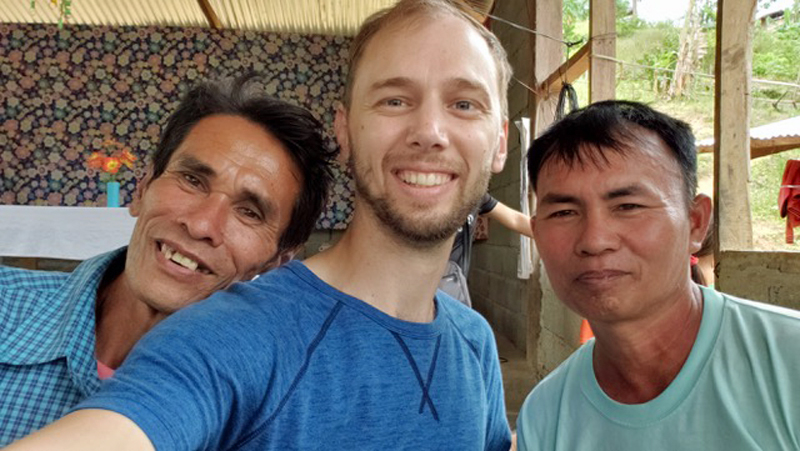
“It was mostly through Manigos,” he adds. “He could speak the language and knew the culture. He has such a heart for his people. He has a God-given call to his people.
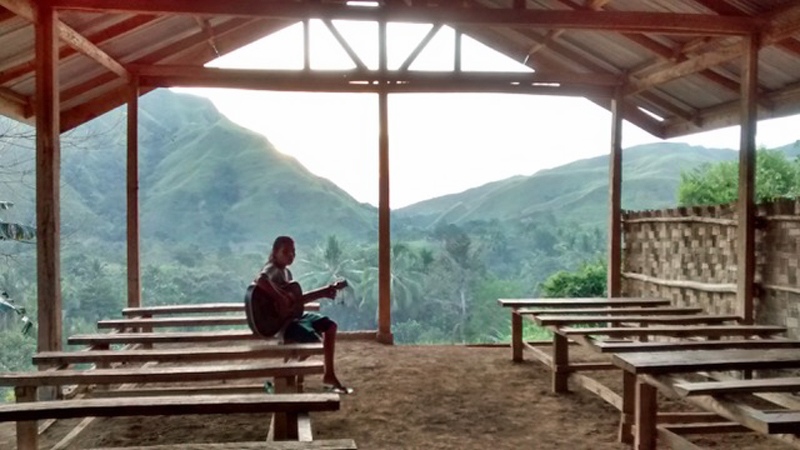
“Last year (2019) we went and visited the tribe and he had taken this small group of people on fire for the Lord and it’s grown to hundreds of believers there now.”

Could God connect an instrument maker living in Moravian Falls, North Carolina with an unreached tribe in the Philippines through a dream?
In 1727 the Moravian Church established a continuous prayer movement that ran uninterrupted, 24 hours a day, for 100 years. Moravian missionaries were part of launching the first large-scale Protestant missionary movement, beginning in 1732.
Did God touch Caleb and Manigos in response to the Moravians’ prayers?
“I felt like the Lord had arranged everything,” Caleb says, “in such a perfect way of organizing everything, just perfect timing. It was such an amazing series of events that took place that I couldn’t take any kind of claim for it.
“The best way I could explain is I was right there in the middle of the journey with God. I felt like He was there in the moment. I was like, yeah, this is Him. This is Him, this is what He did.
This interview was featured in our Best of God Reports Podcast. To hear more of this interview or to listen to other inspiring testimonies with journalist Mark Ellis, listen here: https://podcasts.apple.com/us/podcast/best-of-god-reports-interviews/id1560279290?i=1000550728643
Caleb and Gladys Byerly are the founders of Evergreen Missions. Their focus is to partner with God in bringing His kingdom to the Earth. Caleb and Gladys focus mostly on mentoring and discipling indigenous leaders, who will go to their own people and bring them life from Christ Jesus. To learn more, go here
Adam Fish and his wife Brooke started The Unseen Story, which features firsthand accounts that reveal the reality of God’s love. Their interview/podcast with Caleb Byerly, along with many other great stories may be found here




This is so amazing. thanks for sharing..
Wow wow what inspiring Works of Faith brother Caleb , Evergreen Missions , to literally have a divine dream that led to the creation of a instument that had been taken away . To experience what it is like to participate with God in creating something of worship a people lone used such a instrument play a vital role in the tribal worship of God. Well as a instrument maker we are interested in organzing creating a West Coast Prophetic Worship Orchestra , and would like to discuss the ideal with y for the purpose of instruments being created . We believe worship has and does play a incredible role in heaven as it should on earth and not for entertainment or monetary or recognition for self praise but for opportunities in which the holy spirit can present itself unto any people group for the desire to heal , to speak , to manifest his life . Music has always had a divine place in God kingdom In heaven and should also be upon the Earth as it is in heaven , music as the sound of HIS voice to us , any of us .
[…] here to read […]
Comments are closed.